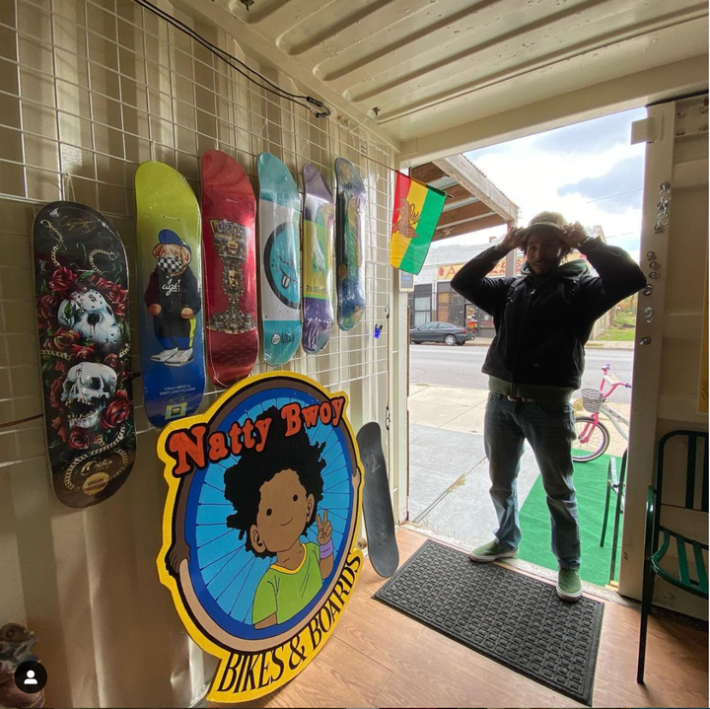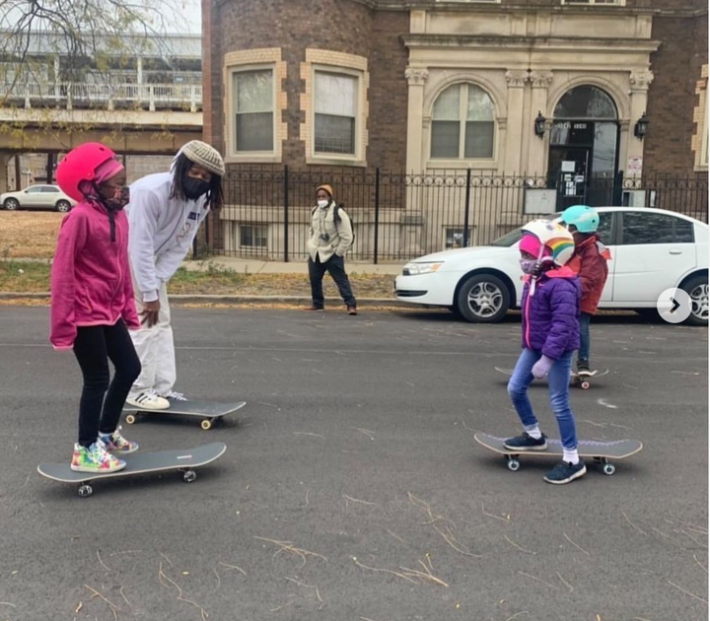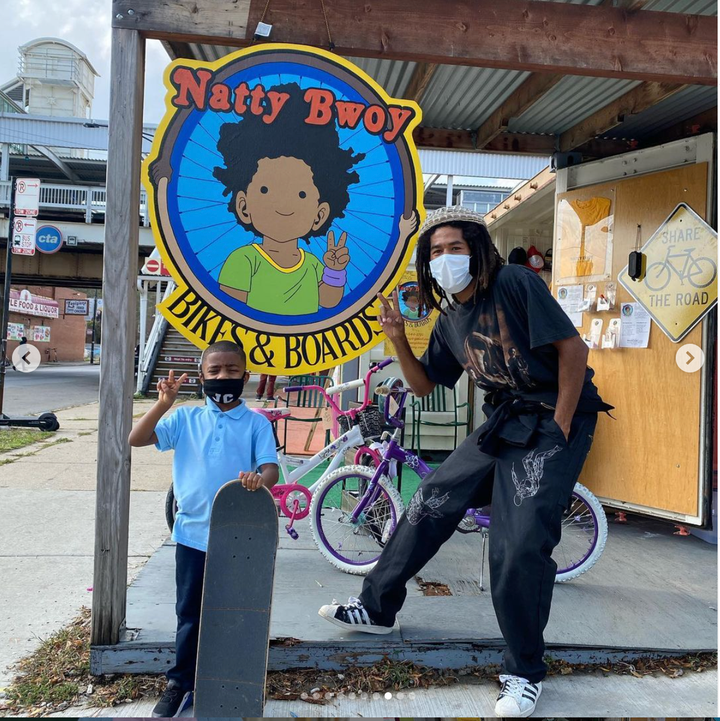There aren't many places to get your bike fixed or buy a skateboard on Chicago's South Side. But this summer a new skateboard and bike shop called Natty Bwoy Bikes & Boards opened in Bronzeville's Boxville market, a collection of shipping container shops on 51st Street near the Green Line. I recently caught up with the owners, brothers Katon, Kahari, and Kari Blackburn, to hear about insights learned from first months in business. They aren't operating out of the shipping container this winter since the container isn't insulated, but they have amassed a treasure of memories and lessons from their time is business so far.
Courtney Cobbs: So, what are some of the things you’re currently working on?
Kahari: Well, our free skateboarding lessons are still happening. We’ve also been brainstorming about merch, holiday donations, and planning for spring and summer. Katan has been pretty passionate about building out an indoor skate park. That’s been a fun continuation of the shop.
CC: I’d love to hear more about this space.
Katon: So there’s a school near the shop on 49th and Indiana, Overton Elementary. It was closed a few years ago and the current owner has been using the gymnasium to keep a youth basketball program going. There’s always people there. We asked if we could put some skating equipment inside and we got the green light. It’s been super fun. It’s like a whole hallway of different obstacles.
Kahari: This space is only open to us, not to the public. We’re thinking of it as a prequel to building something larger.
CC: Very cool. Can you tell me the story of how everything came together for you to open your own shop?
Kahari: It’s funny, we were just talking about writing a children’s book about this. Katon was coming from California, Kari was quitting a job he had been working for a few years, and I was running around hustling trying to figure things out. Our mom and a big homie of ours pushed us to start our own shop. They were saying, “You should start your own thing. Bike shops killed it this summer! Why don’t y’all have a bike shop?” We combined forces and manifested something we wanted to do for a while. Being able to open the doors of the shipping containers and sell a bunch of skateboard products, solicit donations, and fix some bikes was a really fun highlight of the summer and fall for us.

Katon: It was really cool to see some older folks be interested in our shop. A lot of the skate community came out to support. People were telling us they were so happy to have a shop like ours on the South Side.
Kahari: I was so surprised by all the little kids. There was a two-year-old who was so geeked to get on the skateboard. He would get on it, fall and get right back on. I would have to help him and you could just see his excitement. I don't remember a single kid that wasn't excited by what we were doing.
Katon: We’ve had a range of five to twelve kids come to our skateboarding lessons. There’s a small group of kids who come fairly often. Everyone is at different skill levels. We just give advice and instruction as the kids do their thing.
CC: How did you find skateboarding or how did skateboarding find you?
Kahari: We’re native Chicagoans and for us Lupe Fiasco (a Chicagoan rapper and songwriter) lit the fuse for skateboarding within the city when he released his song “Kick, Push” (a song about skateboarding) in April 2006. I remember around that time watching videos of kids in Oakland skateboarding. There were also video games with Tony Hawk, a well-recognized skateboarder. Maybe we had reference to the culture but we just didn’t have the physical means. We had to go through a lot to get our first skateboards and skateboard shoes. This was before online shopping where you can now get whatever you want within days. This experience is why we make free skateboards and free shoes available at our lessons.
CC: I’m curious, did you have to go through any sort of training to know how to repair skateboards?
Kahari: Katon has a lot of experience working in skate shops. He was able to use that knowledge in the shop fixing up skateboard. From the moment you start skateboarding, unless you buy a complete board, you’re kind of expected to build your own board. I remember us starting out customizing our boards.

Photo: Kahari Blackburn
Kari: The skateboarding community is very much DIY. You can go to a skate shop but the general mentality is to do it yourself.
Kahari: In that same vein, we’re putting our heads together to create some DIY videos to help folks at home.
CC: It sounds like those who purchase from you are getting a lot for their money: a board and some knowledge on how to customize it or fix it.
Kahari: It’s funny, one of our friends who is also an entrepreneur clowned us and said we do too many free events. As he was telling us this at an event, a parent came up and asked the price of all the equipment her children were using because she wanted to buy it. It was a nice moment to show that if you put good out into the world it definitely comes back.
CC: Final question, are there any infrastructure changes that would benefit skateboarders you’d like to see in Chicago? Infrastructure in a broad sense.
Kahari: We would love to see more indoor spaces. I’d also like to see a cultural change in drivers. Oftentimes people will come up behind us and honk at us. We’d like to see drivers treat us with the same respect they treat bikers.
CC: Well, as someone who gets around primarily by bike it’s not much better when you’re on a bike, but I totally get where you’re coming from. I can definitely imagine skateboarders have it much worse and I want everyone to be treated with respect and care.
If you’d like to keep up with the guys at Natty Bwoy Bikes and Boards, follow their Instagram for updates. A website is forthcoming. Streetsblog will share it on social once it's live.




